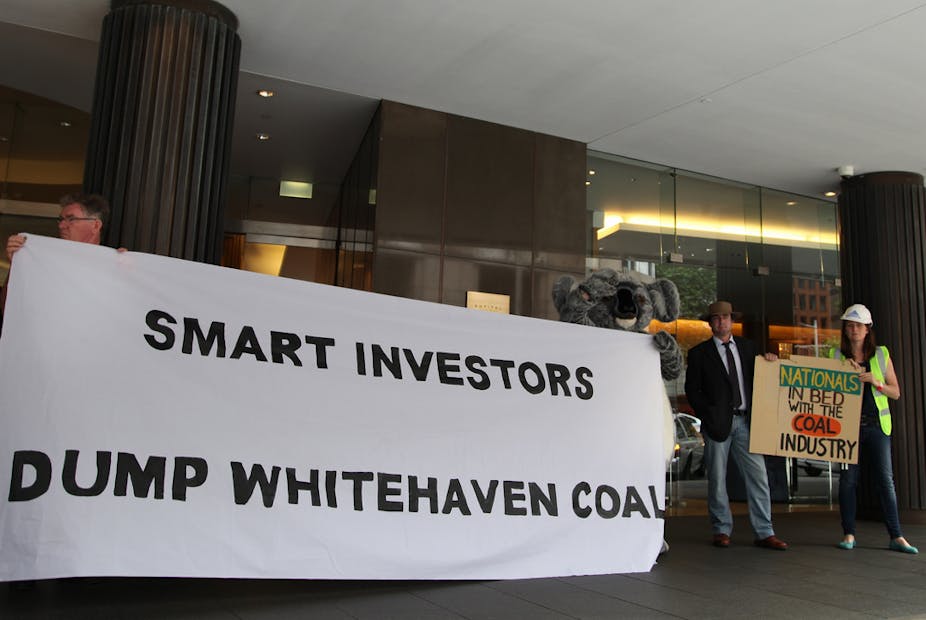It has has been suggested a hoax by anti-coal activist Jonathan Moylan wiping million of dollars from Whitehaven Coal’s share price was an act of “civil disobedience”, akin to chaining a person to a tree, a public protest or even a prank call on the radio.
Activists across all campaigns have traditionally used a variety of techniques to gain the maximum amount of publicity.
From public statements made by Mr Moylan, it is clear he carefully considered what he was doing prior to impersonating the bank’s head of corporate sustainability and forging the ANZ logo to create the fake media release.
The release, which incorrectly claimed the bank had withdrawn a $1.2 billion loan due to environmental concerns over Whitehaven’s Maules Creek development, caused the shareprice to dive sharply, before recovering following statements from both Whitehaven and ANZ.
Unfortunately for Mr Moylan, the legislation that deals with corporate fraud is drafted in a way that imposes a high penalty on false or misleading statements made in respect of traded securities on the Australian Securities Exchange.
Section 1041E of the Corporations Act 2001 (Cth) specifically deals with this type of situation and has a maximum criminal penalty of 10 years imprisonment and up to $495,000.
The difference between a public nuisance and civil disobedience is the impact on the general community. A protest normally provides publicity for a cause and brings the matter to the general public’s attention, but causes little harm to the community.
A fraud - and in particular one that impacts on the share market - has huge consequences. Financial services in Australia is the single biggest industry in the economy (over 10% of GDP) and the confidence in the ASX and other securities markets is critical. Frauds and false information impact on the whole markets creditability and investors are less likely to invest, particularly international investors.
Markets operate on a concept of efficient market hypotheses; that is, all available public information is calculated into the current share price. When insider trading occurs, it is a distortion of timing of good or bad news that would materially impact the share price. Market manipulation is when false information distorts the share price and this undermines the whole market.
Misleading media releases have been subject to the High Court of Australia’s review in 2012 with the James Hardie litigation (where the directors were held to be in breach of the law) and Fortescue Metals Group (where there was no breach as the CEO honestly and reasonably believed the information was true). These were civil penalty actions as there was no suggestion of fraud or dishonesty by the companies in question.
Normally false information (fraudulent or falsely misleading under s 1014E) as allegedly occurred in the Adult.com case heard by the High Court in November 2012, indicated an intention for parties to profit from the false information.
There is no suggestion Mr Moylan intended to profit from the false statement, but when the shares dropped by 8.8% to $3.21, $314 million was wiped from shareholder funds. Individual small shareholders would have unfairly lost money by the fraud.
The corporate regulator, Australian Securities and Investment Commission, is investigating and if there is sufficient evidence, it should bring a criminal prosecution.
The fact that this is the third such fraud in the last six months, the others being a false takeovers of David Jones and MacMahon Holdings, could really begin to undermine the confidence in the ASX.
One final consideration to redress the small shareholders that suffered a loss is for the ASX to use its powers to cancel the transactions. These provisions are intended for when a mistake occurs, but have been used in fraudulent circumstances before, such as with Magnet Group in 1984 on the old Perth Stock Exchange, when a forged letter delivered to the Exchange suggesting an imminent takeover bid caused its shares to skyrocket.
There have been some knee-jerk reactions to call for more laws and regulations to cover such situations. I would argue strongly that the existing Corporations Act and other Crimes Acts deal with all these issues adequately and it is up to the regulators to investigate and enforce if necessary.
It is important that activists should use every method and in particular the power of the media and social networking to get the relevant message out to the public or target audience, but to stay within the boundaries of the law. Having any criminal conviction against your name does not help the environment nor your personal standing.

